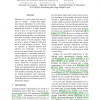Free Online Productivity Tools
i2Speak
i2Symbol
i2OCR
iTex2Img
iWeb2Print
iWeb2Shot
i2Type
iPdf2Split
iPdf2Merge
i2Bopomofo
i2Arabic
i2Style
i2Image
i2PDF
iLatex2Rtf
Sci2ools
ACL
2015
2015
Unsupervised Cross-Domain Word Representation Learning
Meaning of a word varies from one domain to another. Despite this important domain dependence in word semantics, existing word representation learning methods are bound to a single domain. Given a pair of source-target domains, we propose an unsupervised method for learning domain-specific word representations that accurately capture the domainspecific aspects of word semantics. First, we select a subset of frequent words that occur in both domains as pivots. Next, we optimize an objective function that enforces two constraints: (a) for both source and target domain documents, pivots that appear in a document must accurately predict the co-occurring non-pivots, and (b) word representations learnt for pivots must be similar in the two domains. Moreover, we propose a method to perform domain adaptation using the learnt word representations. Our proposed method significantly outperforms competitive baselines including the state-of-theart domain-insensitive word representations, and re...
Related Content
| Added | 13 Apr 2016 |
| Updated | 13 Apr 2016 |
| Type | Journal |
| Year | 2015 |
| Where | ACL |
| Authors | Danushka Bollegala, Takanori Maehara, Ken-ichi Kawarabayashi |
Comments (0)

